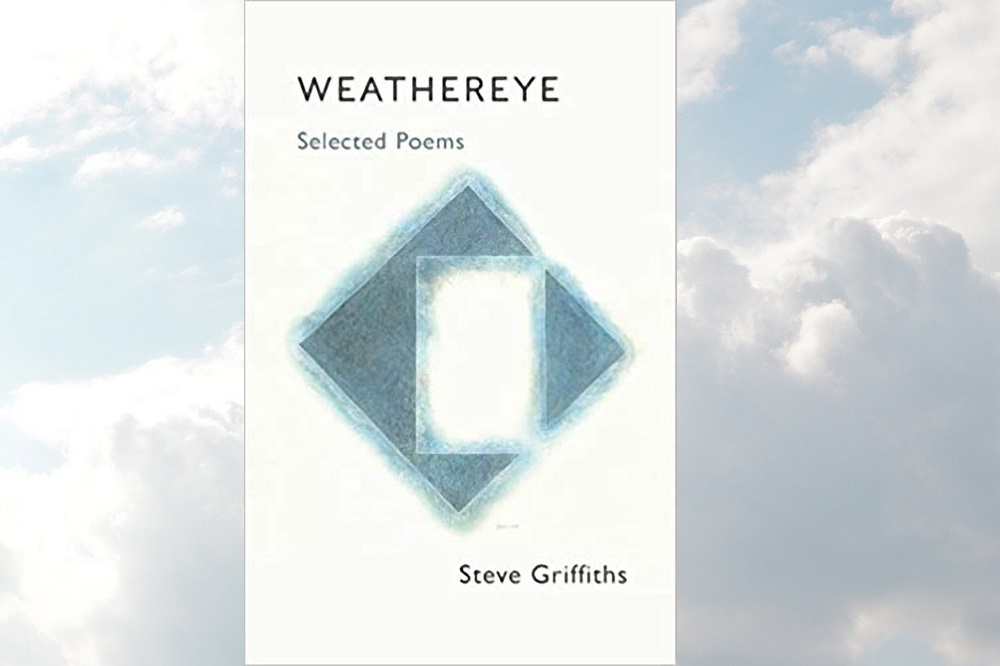Review: Weathereye is the harvest of 40 years of poetry from Steve Griffiths

Jon Gower
Here we have the harvest of four decades’ worth of poetry-making, which show the animating concerns of the man and his certain aptitude for this art form.
Words are Steve Griffiths’ best friend, as he puts it, especially his own, and ‘there are more of them about/than there used to be.’ But they can be unwieldy, and their power can wane or wither and
They don’t string together
on the page and stay there;
like birds on the wire
they abandon you, autumn
can come at any time.
Birds fly through many of the pages of this selection, from urban goldfinches through ‘oystercatchers drilling for more land’ to ‘fifteen hundred starlings’ which fly with ‘mathematical, valedictory joy.’ But Griffiths is a political poet, a welfare rights worker and latterly a policymaker in social and health inequality, so some birds appear as a shock, such as the one in a poem about the shooting of the Levellers, members of a movement during the English Civil War that fought for equal rights. Over three hundred of them were locked up in the church at Burford in west Oxfordshire and in May 1649 the ringleaders were summarily shot.
Griffiths’ poem about the event ends with the image of one of the survivors walking away, free, yes, but not a free bird:
He walked away unmarked
his stomach ploughed with fear
across watermeadows,
turning in his mind
the bird that will only fly inside a jar
that awaits a shattering,
a reckoning,
the unbearable rush of freedom:
his name without a gravestone,
in a font.
While the poems range freely from bullfighting to ancient burial chambers, from nuclear warheads to geological events there is one place, one theme, that recurs more than any other.
Amlwch
It’s the poet’s home town of Amlwch, on the north western rim of Anglesey but recast as a place entirely unlike any other place on earth. It is now called Al-Chwm, a place where time isn’t linear, its currency is uncertainty and the locals wear mirrors on their clothes in a ‘town that strains on the leash/that slips out of my hand.’
It’s a place where one alternative history maintains it once expanded to the size of Siberia, or where a person is rewarded for something by being left alone. It’s a very odd, mutable mirage of a town, built on the shifting sands of the poet’s imagination. There are lines in one of the poems that may help explain the wondrous, mythical recasting of Amlwch as Al-Chwm:
A man carries the place he comes from
on his back as he unravels
it is transformed with every step as he is.
The Arabic sounding name is echoed in the fact that the al-Hambra palace has been magically transported, in one verse, from southern Spain and rebuilt on the site of an old chemical works on a coastal promontory and furthermore by a discovery, made through DNA that connects its denizens with a ‘small Saharan people.’
Uncertainty reigns here, in a town which is ‘up for some kind of prize but the judges get lost’ and the unemployed get taken by lorry to work short shifts in the Elysian fields.
The Al-Chwm poems are both playful, accessible and profound: think Jorge Luis Borges, the blind, visionary Argentine poet meets one of the Liverpool Beat Poets.
Steve Griffiths is part of a generation of Welsh poets who all feed into or are acknowledged in the poems.
One of the most experimental of these, ‘Unwritten Chapters’ is a homage to the arch-experimentalist Peter Finch, with it fractured line breaks and near wanton repetition. Another is an elegy to the presiding spirit of the scene, John Tripp, ‘snarling at flummery’ with a borrowed carafe in his hand. Meanwhile another poem is dedicated to his poetic co-worker, Robert Minhinnick, the dedicatee of a lovely lyric meditation on the geology of Shropshire called ‘The Shelveian Event.’
But Griffiths is his own man, a ranging intelligence and an exquisite chronicler of later-life love and its complications and rewards. The poems chosen from his volume ‘Later Love Poems’ are worth the price of admission all by themselves, tender, telling and true as they are.
One is timely, now that the buds unfurl outside the window, and is the poem Griffiths picks to close this fine selection – which has given this reader at least a dozen poems he will return to again to again, certain in the knowledge that they will continue to reap rewards. It is called, simply ‘Spring’ and its final stanza ends a review just as carefully and elegantly as it closes ‘Weathereye:’
I had thought my capacity
for happiness was limited.
It is good to have arrived here
even if a little late,
discovering a language
I was exiled from,
waking with the ground
strewn with clouds and flowers
and images with their names
that are breaking cover, unafraid.
You can buy a copy of Weathereye here.

Support our Nation today
For the price of a cup of coffee a month you can help us create an independent, not-for-profit, national news service for the people of Wales, by the people of Wales.





